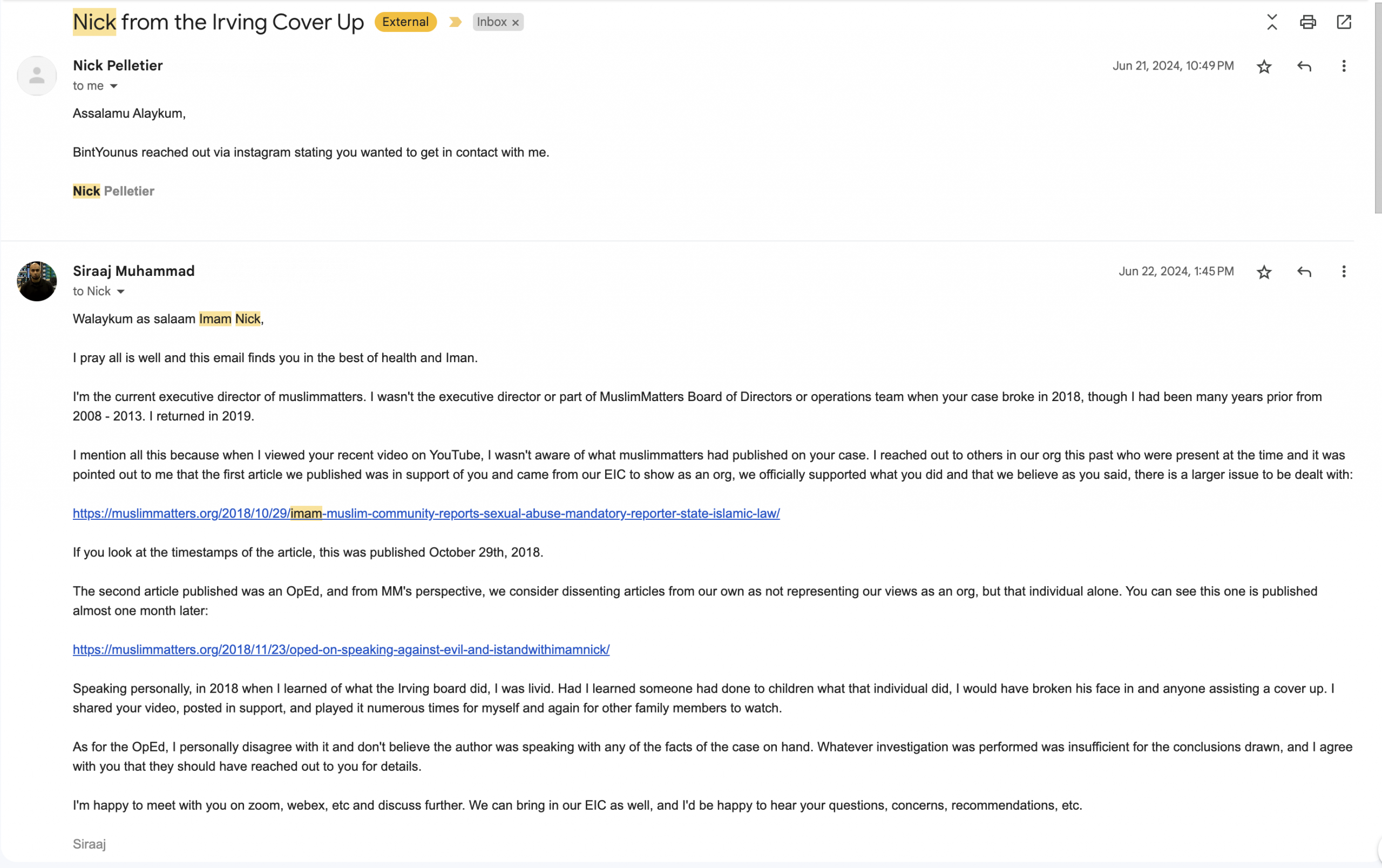Purpose
The reason we are writing this post is because all attempts to meet with Imam Nick and resolve his issues with us have failed. We tried several times either directly or via intermediary and are left with no recourse except a public statement as well as providing full transparency regarding our communication with him. We hope that by “laying our cards on the table” openly, Imam Nick will reconsider and meet with our team.
Background
Last summer, Imam Nick Pelletier released an impassioned video regarding multiple child sex abuse incidents that took place in a Dallas masjid in 2018 (our Editor-in-Chief wrote in support of Imam Nick’s stance at the time the scandal broke). He recounted the fallout that occurred as a result of his khutbah condemning board members for:
- Performing their own investigation
- Not reporting the incident to police immediately
- Allowing the perpetrator to escape back to their home country of Pakistan
He additionally added details regarding the abuse incident, making clear the perpetrator wasn’t simply engaging in culturally appropriate gestures of affection or, as was alleged in a MuslimMatters op-ed [def: an “opposite editorial” which strongly expresses a personal opinion of the writer, but does not necessarily reflect the views of the publication], “inappropriate touch”, but sucking on the face of the children involved until they had bruises and grabbing their crotches while doing so.
Finally, Imam Nick mentioned a hit piece (referring to the Oped) was written on MuslimMatters attacking his credibility, claiming no molestation had taken place, and that he was harshly overreacting.
Here is that video:
MuslimMatters’ Response
Executive Director Reaches Out
Upon seeing the video above, I responded to the video directly in the comments section – in fact, I was the very first comment. I told Imam Nick I not only supported what he did, if it were my child I would have gone after the perpetrator myself and potentially the board members physically. I also left my email address for him to contact me. For reasons unknown, my comment was deleted.
Editor-in-Chief and Podcast Team Reaches Out
Similarly, our Editor-in-Chief, Hena Zuberi, states she also attempted to reach out (with a link to her editorial in his support that was published a day after he gave a khutbah about the incident at his mosque) but her comment was deleted. One of our podcast hosts Irtiza Hasan reached out to Imam Nick to come on the MuslimMatters podcast and have the floor to say whatever he thought appropriate to discuss. After initially responding with questions around logistics, Imam Nick didn’t follow-up with communication, but used Irtiza’s email in a subsequent Instagram reel posted here:
https://www.instagram.com/reel/C8QJVybubh0/?utm_source=ig_web_copy_link
Imam Nick Posts Questions for MM on Instagram
Communication with Irtiza ceased after this post. Within the Instagram post, Imam Nick asked some questions such as:
- If I was wrong all this time, why even give me the time of day?
- Why even offer me a platform?
- If I was right all this time, why did it take 5 years for you to get back to me?
What Imam Nick Didn’t Know
It became clear to me that Imam Nick wasn’t aware the MuslimMatters organizational public position on what happened at the Dallas masjid was that we supported him.
For example, Imam Nick mentioned multiple times in the first video above that FACE had uploaded his khutbah video and shared it after the Dallas masjid hid it. He didn’t mention that MuslimMatters had also uploaded the video to its YouTube channel on Oct 29th, 2018.

On the same day, we also published a post authored by our Editor-in-Chief highlighting the good Imam Nick had done, and expanding on the mandatory reporting aspect as both an Islamic duty and legal obligation no one should neglect to secure the rights of the victims. That post can be found here:
Sacred and Civic Trust: Imam Calls Out Suspected Sexual Abuse In Friday Sermon
Answering Imam Nick’s Questions from Instagram
In response to questions above, we never thought he was wrong. Not ever. We all held the position that what he did was correct. In answer to his second question, because we thought he did the right thing, we would of course offer to platform him. And to his final question, why wait five years to get back to him – as far as we were concerned, our public position has always been that we support what he did. We only got back to him recently because he made us aware that the article from Imam Jawad had been causing him problems.
We get where he was coming from. Because he didn’t know we actually supported his position, and he was perhaps only recently aware of our support for him, he thought we were another “go along, get along” organization. That’s not us – this organization was established to break through and talk about these taboo topics from a traditional point of view because we only have a culturally avoidant mindset in one corner, and an “everyone is guilty until proven innocent” group on the other end. Like Imam Nick, we have been labeled as being too activist, too social justice, and too “feminist” for raising these topics.
Two days after we published his video with supporting materials, we also published the following:
Preventing Child Abuse: What Can You Do?
Anyone who wants to check our archives, you will find that we have been publishing articles, sharing resources, and calling attention to these problems as far back as 2009, so we are certainly not riding some bandwagon or coming to the party late – if anything, we’re among the first traditional / orthodox organizations speaking up and speaking out about these issues – you can go through the archives on this link and find many articles over more than a decade:
https://muslimmatters.org/tag/sexual-abuse/
Imam Jawad’s Article
Misconceptions About How This Article was Published
A few things to know about this article:
- Shaykh Yasir Qadhi has had no input on this article. He didn’t know it existed, that it was published, or have anything to do with it. While Shaykh Yasir has advised the organization in the past, he has no position, no authority, and certainly no awareness of day-to-day operations and in the time in question, that was most certainly the case. When I returned to MM in early 2019, he also left as an informal advisor.
- Other staff members mentioned by Imam Nick and other critical videos such as Ahmad Zamanian also had no input on this article going up.
- Our organization didn’t put this article up because we were attempting to “both sides” the issue – in an email chain (which we will share below in full), we told Imam Nick we published a supporting article and not just Imam Jawad’s article to demonstrate there was no agenda to create a hit piece to discredit Imam Nick as someone who was experiencing a “cultural misunderstanding”.
My Thoughts on Imam Jawad’s Article
After having read it for the first time, I found his position / authority, statements, conclusions, and recommendations unfounded. In examining the article and Imam Nick’s videos, it became clear that he:
- Didn’t speak to Imam Nick to understand what had occurred or why he delivered his khutbah.
- Didn’t speak to the masjid board directly, but read a posting (”I have no relationship with the Masjid nor its management, but it seems to me after doing my little investigation…”).
- Didn’t speak to the police directly about the case or have access to files, paperwork, documents, or evidence (”It is important to note that the officer could not comment on the actual investigation and spoke to me generally. It is also important to note that this article should not be used to determine what is and what isn’t illegal behavior.”)
- Didn’t speak to any of the victims or their parents.
- He’s not from the community and doesn’t know anyone in the board leadership, Imam Nick, or the families involved.
Imam Jawad reached out to me recently and what I’ve written above, I told him directly, and that I would post my own opinion within this write-up. He has been very gracious, wanting to meet with Imam Nick, reconcile, and bring this matter to a close. He has stated to me he is more than willing to retract his own article and even apologize so that amends can be made in this situation, inshaAllah.
Imam Jawad’s article also provided sincere advice to remain calm and not become angry. This is generally good advice, but we remain angry for the sake of Allah  when our children are taken advantage of or when community leaders to try to hide these matters and “go along, get along.” The board put on a dog and pony show after the khutbah to say Imam Nick is their brother, and thank you, and so on, and then fired him soon after.
when our children are taken advantage of or when community leaders to try to hide these matters and “go along, get along.” The board put on a dog and pony show after the khutbah to say Imam Nick is their brother, and thank you, and so on, and then fired him soon after.
To be clear, I am not claiming Imam Jawad is trying to support or hide child sex abuse (or that he is a “go-along, get-along” type). However, Imam Nick’s advice that criminal matters go to the police is cogent. There is no room for the board of any masjid board to be involved once the discussion is physical or sexual abuse of minors, adults, and so on. Our faith-based institutions aren’t designed to handle criminal matters and as such should defer to the law when such matters occur. We need people with training in law, counseling, abuse, as well as the community context lack to perform thorough investigations rather than leave it to community volunteers.
Discussion with Imam Nick
Email Exchange Between Myself and Imam Nick
I finally had the opportunity to speak with Imam Nick in July via email exchange. He received a message on Instagram from our staff and wrote to me. I explained both our support for his position and desire to have our Editor-in-Chief and myself meet with him where we could answer all his questions directly (eg. who was involved in bringing the article up, why did it go up, can we take it down, etc.). The following is the full email exchange:




Imam Nick’s Friend Reaches Out
In addition, a friend of his reached out to me on Facebook asking what could be done to fix the situation. I told the friend that I had already spoken with Imam Nick, tried multiple times to set a meeting time, and none was ever proposed. I showed the friend the email chain as well so he knew the full context of what had transpired, and again asked if he could try and set things up between us. He tried and said to me over text that Imam Nick wouldn’t meet with us without providing a reason why. We have tried without success since July to reach him before publishing this article.
Why Is MM Writing A Public Statement?
We support what Imam Nick did for the community and think it’s an absolute shame they let him go. We’ve gone through decades of critique from different organizations, discussion forums, and social media influencers. We ignore all of them because they come and go and we continue to do as we do. Most org leaders I’ve advised privately, I always say, ignore the trolls, don’t feed them.
In this case, we see ourselves as kindred spirits with Imam Nick – fighting child sex abuse (or any sex abuse), fighting the culture of covering it up, fighting the shaming of victims for coming forward, fighting the weaponizing of shari’ah and cultural propriety that has been part of our mission on MuslimMatters – to offer a proper, shari’ah-practicing based perspective to combat these social ills in our community from our faith’s perspective.
From the videos Imam Nick has put out, we understand that he’s gone through a lot of hurt, pain, rejection, ostracizing, and that his family has struggled because he did the right thing, took a principled stand against the system, and the system dragged him and everyone he loves down. We understand that he may be skeptical, wary, and protective of himself, his reputation, and any other concerns he may have that we’re not aware of, and this may be why he has hesitated to set a time with us.
As in the emails, I invite you, Imam Nick, again to meet with our editor-in-chief Hena, Imam Jawad, and myself. We’re happy to answer any questions you have, as well as take recommendations to make things right. As I said in the email, we are absolutely not averse to apologizing, taking anything down, and so on, but let’s meet, get on the same page about what has happened in the past, and how we can move forward not only to between MuslimMatters and yourself, but also so we can continue to fight the good fight against the real problem we have both been calling out.
I say it publicly, transparently, so our community of readers can see what we’ve done, how we’re trying to address it with you, and even hold us to account. May Allah  help us reconcile our differences and move forward in a positive manner, ameen.
help us reconcile our differences and move forward in a positive manner, ameen.
Final Thoughts
We understand why Imam Nick is upset with the oped published, and irrespective of any further critical responses he may have for us and how our editorial decisions were taken in publishing Imam Jawad’s article in 2018, we remain steadfast in our stance that we stand with Imam Nick, both in what he did back in 2018 as well as now in fighting against child sex abuse and whatever exists in our community that enables it.
We will be happy to answer any questions in the comments below. As always, please keep the discussion / dialogue civil and respectful.
The post MuslimMatters Still Stands With Imam Nick appeared first on MuslimMatters.org.

 Blessings.
Blessings. said:
said: 



 Vishal Mehrotra
Vishal Mehrotra 




 reported on the authority of the Messenger of Allah
reported on the authority of the Messenger of Allah 

